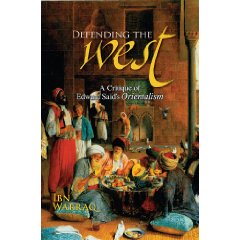|
Reviewed by Robert P. Barnidge, Jr., Ph.D., Lecturer, School of Law, University of Reading Just a few years ago, Vintage Books celebrated the twenty-fifth anniversary of the publication of Edward Said’s Orientalism by releasing a special edition of the book. This new edition contained a preface in which Said, reminiscent of his approach in Orientalism itself, sought to privilege his narrative over those of his colleagues who he variously described as “intellectual lackeys”; “Orientalists who betrayed their calling as scholars”; promulgators of “preposterous phenomena”; authors of “shabby screeds bearing screaming headlines”; “political polemicists pretending to [imparted] knowledge”; “all of them”—according to Said—“recycling the same unverifiable fictions and vast generalizations so as to stir up ‘America’ against the foreign devil.” Such invectives, which in Said’s preface are levied at both named and unnamed individuals, typify the petty, politicized atmosphere in scholarship and discussions about the Orient generally that Orientalism helped to create and nurture since its initial publication in 1978. Using Orientalism as a backdrop, Ibn Warraq’s Defending the West: A Critique of Edward Said’s Orientalism takes aim at Said’s methodology and conclusions and seeks to rehabilitate the reputations of many of those scholars who Said so deliberately sought to discredit in Orientalism. Warraq’s study, a thorough retrospective of Western knowledge that begins with the ancient Greeks, reveals a truly remarkable picture. Rather than being tools of domination, Warraq’s account reveals scholars engaged in an unceasing search for “objective knowledge,” in an almost spiritual pursuit of truth, or logos. He fundamentally challenges Orientalism’s thinking and the needless self-flagellation of things Western that it has spurred both inside the academy and outside of it. By so doing, Warraq provides an impassioned, and thoughtful, defense of the West. Part I of Defending the West—which contains helpful references to specific passages and their corresponding page numbers in Orientalism—charges Said with, among other things, a sometimes meaningless and pretentious writing style, contradictions and historical inaccuracies, dishonest and strained interpretations, and an obsessive sense of self-pity and complaint. Warraq does a particular service in pointing out some of Orientalism’s historical errors, the accuracy of which many of Said’s readers would likely have taken for granted. Part I provides an overall template for Defending the West, with Parts II and III logically flowing therefrom with evidence to strengthen the arguments introduced at the beginning of the book. For Warraq, the West’s considerable insights and contributions have not been accidental. Rather, they have flowed, logically, from the “defining values of the Occident, or what are the tutelary guiding lights of, or the three golden threads running through, Western civilization — namely, rationalism, universalism, and self-criticism.” These three elements have combined in a remarkable pursuit of truth that has been open to and respectful of Oriental insights. Indeed, for Orientalist scholars, progress requires expanding one’s geographical and intellectual horizons, through a dynamic process of creative destruction and questioning, an ethic of self-criticism that Warraq describes as the “entire warp and woof of Western civilization.” Orientalist scholarship has not been about appropriating the plunder and riches of the Orient. In fact, as Warraq points out with examples spanning classical antiquity, the Middle Ages, and cultural engagement in India to painting, sculpture, literature, and music, Orientlism’s impact has been quite the opposite. The intentions of English scholar Simon Ockley, who scrupulously labored away with the Arabic language at Oxford University, typify Orientalists’ aims: “[n]o conspiracy or dreams of empire, just a desire to learn.” Said, of course, would have rejected this as an ideological impossibility, but as Warraq puts it, Said’s “already prepared Procrustean bed” also leaves unexplained, to give but one example, the deep respect for and love of India felt by many Orientalists and the significant contributions of these same Orientalists to the Indian Renaissance and the preservation and revitalization of much of India’s cultural heritage. Defending the West has a broad appeal. While those who have read Orientalism and other works by Said will have an advantage, determined and diligent non-specialists will also benefit from Warraq’s contribution. Certain chapters are more accessible to the non-specialist than others, but a concerted effort by all readers of this sometimes densely-written book will be rewarding. Let us hope that Defending the West engenders as much debate as Orientalism did three decades ago. |


 Defending the West: A Critique of Edward Said’s Orientalism
Defending the West: A Critique of Edward Said’s Orientalism